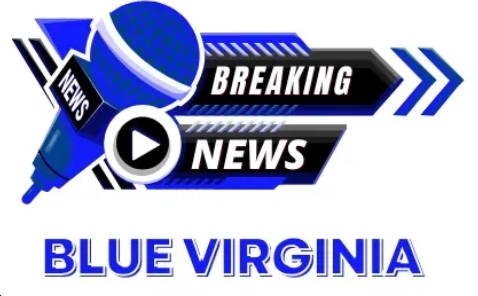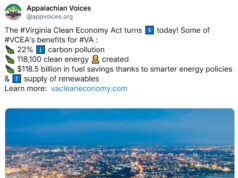by Ivy Main; cross posted from Power for the People VA
The State Corporation Commission (SCC) has approved Dominion Energy Virginia’s so-called Community Solar pilot program, under which the utility will offer its residential and commercial customers the output of solar farms to be built by independent solar developers here in Virginia.
Customers will have the option to meet either all or part of their electric demand with solar. The added cost of the program, at least initially, will be 2.01 cents per kilowatt-hour (kWh). For a customer who uses an average of 1,000 kWh monthly and wants to use only solar, that would add up to a premium of $20.10 per month.
Customers who want to meet just a portion of their total demand with solar will have the option of subscribing to “blocks” consisting of 100 kWh, up to a maximum of 5 blocks for residential customers or 10 blocks for non-residential customers.
The premium cost of the program may surprise customers who have heard that large-scale solar is now one of the cheapest sources of energy in Virginia. But according to Will Cleveland, a staff attorney at the Southern Environmental Law Center who helped to develop the program, cost was not the only consideration in choosing which solar facilities to include in the program.
Facilities were selected to be smaller and distributed around the state, in keeping with the “community” concept, which meant they sometimes came with higher prices. Program costs also include Dominion’s costs of administration and marketing. Cleveland says he consulted experts who advised him these numbers were reasonable.
In addition to selling the electrical output of the solar facilities to customers, Dominion will retire the associated renewable energy certificates (RECs). The RECs represent the legal proof that the energy comes from solar, an important factor for commercial customers that wish to represent they use renewable energy in their business. “Retiring” the RECs guarantees that Dominion isn’t also selling them elsewhere.
The program is a result of legislation passed by the General Assembly in 2017 that authorized a three-year pilot program in Dominion’s territory for up to 40 megawatts (MW) of solar capacity. The legislation also authorized Appalachian Power to develop up to 10 MW for a similar program. To date, Appalachian Power has not submitted a proposal.
Although the program is called “community solar,” customers will not own shares in the solar facilities, and the facilities do not have to be located in the same communities as the customers. Virginia law does not permit the kind of community solar in which customers share in the ownership and output of solar facilities.
Calling Dominion’s program “community solar” is bound to confuse people, and it’s hard not to believe that was a calculated move on the utility’s part. Yet Dominion’s solar offering is a major step forward for the company, and for customers who aren’t able to put solar panels on their own rooftops.
And while it is somewhat more expensive than the company’s Green Power Program, it should prove much more attractive with people who understand the difference between the programs.
Subscribers to the Green Power Program don’t get electricity from renewable energy; Dominion sells them regular “brown” power, then tacks on an added charge to match the dirty energy with renewable energy certificates (RECs). Most of the RECs come from existing wind projects in other states, where wind is already the cheapest power source. By contrast, the solar program provides solar energy (and the RECs) from new Virginia solar farms, ones that would not get built otherwise.
Dominion is expected to begin signing up subscribers for its solar program later this fall, with the program getting underway once the solar projects come online next year. For those of us without the sunny roofs needed to put up our own solar panels, this promises to be—for now—the next best option.
A version of this article first appeared in the Virginia Mercury, a new (and if I do say so, quite excellent) independent online news source dedicated to covering Virginia issues that matter.


 Sign up for the Blue Virginia breaking news newsletter
Sign up for the Blue Virginia breaking news newsletter![Wednesday News: “The Grand Opening of an American Concentration Camp”; Trump Threatens to Arrest Mamdani; “Poorest Americans Would Be Hurt By Trump’s Big Bill”; [VA] GOP nominees share stage, but not unity”; “Hoos your daddy, Virginia?” (Not Youngkin)](https://bluevirginia.us/wp-content/uploads/2025/07/montage0702-238x178.jpg)








![Wednesday News: “The Grand Opening of an American Concentration Camp”; Trump Threatens to Arrest Mamdani; “Poorest Americans Would Be Hurt By Trump’s Big Bill”; [VA] GOP nominees share stage, but not unity”; “Hoos your daddy, Virginia?” (Not Youngkin)](https://bluevirginia.us/wp-content/uploads/2025/07/montage0702-100x75.jpg)